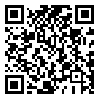Volume 20, Issue 59 (12-2020)
jgs 2020, 20(59): 253-267 |
Back to browse issues page
Download citation:
BibTeX | RIS | EndNote | Medlars | ProCite | Reference Manager | RefWorks
Send citation to:



BibTeX | RIS | EndNote | Medlars | ProCite | Reference Manager | RefWorks
Send citation to:
lafafchi M, Dahashi Sharif M, Etesam I. (2020). Identify and prioritize architectural and cultural indicators based on the application of technology in the age of globalization (Case Study: Tehran City). jgs. 20(59), 253-267. doi:10.29252/jgs.20.59.253
URL: http://jgs.khu.ac.ir/article-1-3535-en.html
URL: http://jgs.khu.ac.ir/article-1-3535-en.html
1- Doctor of Architecture, Department of Architecture, Faculty of Architecture and Urban Planning, Central Tehran Branch, Islamic Azad University, Tehran, Iran, Doctor of Architecture, Department of Architecture, Faculty of Architecture and Urban Planning, Central Tehran Branch, Islamic Azad University, Tehran, Iran
2- Assistant Professor, Department of Architecture, Central Tehran Branch, Islamic Azad University, Tehran, Iran, Assistant Professor, Department of Architecture, Central Tehran Branch, Islamic Azad University, Tehran, Iran ,Moz.dehbashi_sharif@iauctb.acc
3- Member of Faculty and Professor of Architecture, Islamic Azad University, Tehran, Iran, Member of Faculty and Professor of Architecture, Islamic Azad University, Tehran, Iran
2- Assistant Professor, Department of Architecture, Central Tehran Branch, Islamic Azad University, Tehran, Iran, Assistant Professor, Department of Architecture, Central Tehran Branch, Islamic Azad University, Tehran, Iran ,
3- Member of Faculty and Professor of Architecture, Islamic Azad University, Tehran, Iran, Member of Faculty and Professor of Architecture, Islamic Azad University, Tehran, Iran
Abstract: (7925 Views)
Technological innovations are known to be effective parameter in developing and designing architectural spaces in metropolis; however the impact of technology on the architecture of different communities in the world is not the same. The purpose of the paper is to depict a clearer view of the relation between culture and technology in contemporary architecture in globalization era. This paper examines the theories in the context of globalization by applying descriptive-analytical method by investigating documents. The results indicate that the relation between culture and architecture in this context based on the viewpoint of the Castells and Giddens and Robertson, that based on the limited boundaries, limitations and network communities, is not weakened, but a new form has taken stand against the unification strategy and represents a kind of unity while pluralism.
The usage of technology includes removing boundaries, flexibility and diminution of distances. This can be investigated not only in the physical dimensions but also in various cultural aspects. The consequences affect architecture and culture that can be maintained by retaining the transcendental concepts of the past rather than superficial imitation of culture and technology in order to redefine new layers with the introduction of technology in globalization era.
The usage of technology includes removing boundaries, flexibility and diminution of distances. This can be investigated not only in the physical dimensions but also in various cultural aspects. The consequences affect architecture and culture that can be maintained by retaining the transcendental concepts of the past rather than superficial imitation of culture and technology in order to redefine new layers with the introduction of technology in globalization era.
Type of Study: Research |
Send email to the article author
| Rights and permissions | |
 |
This work is licensed under a Creative Commons Attribution-NonCommercial 4.0 International License. |

This work is licensed under a Creative Commons — Attribution-NonCommercial 4.0 International (CC BY-NC 4.0)






